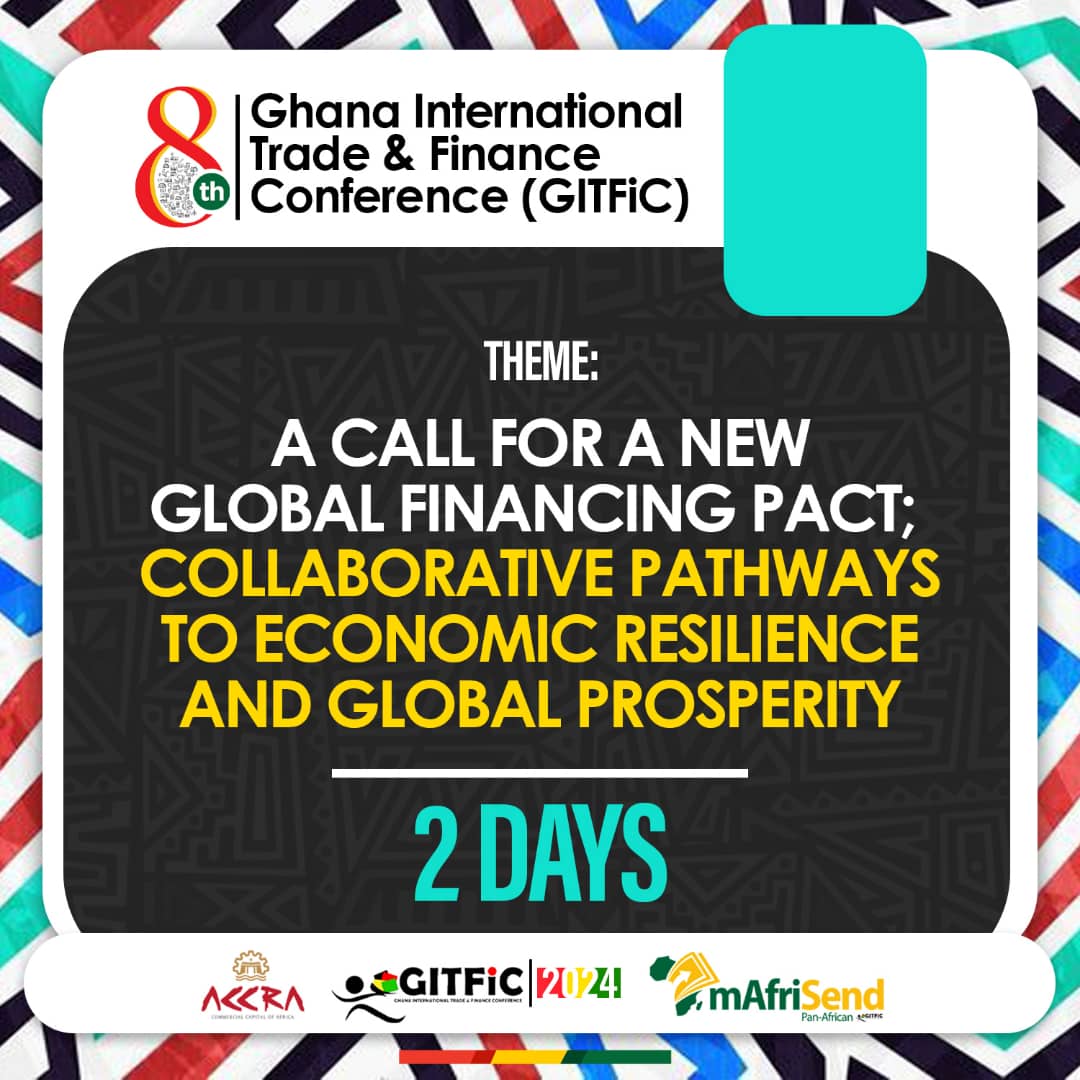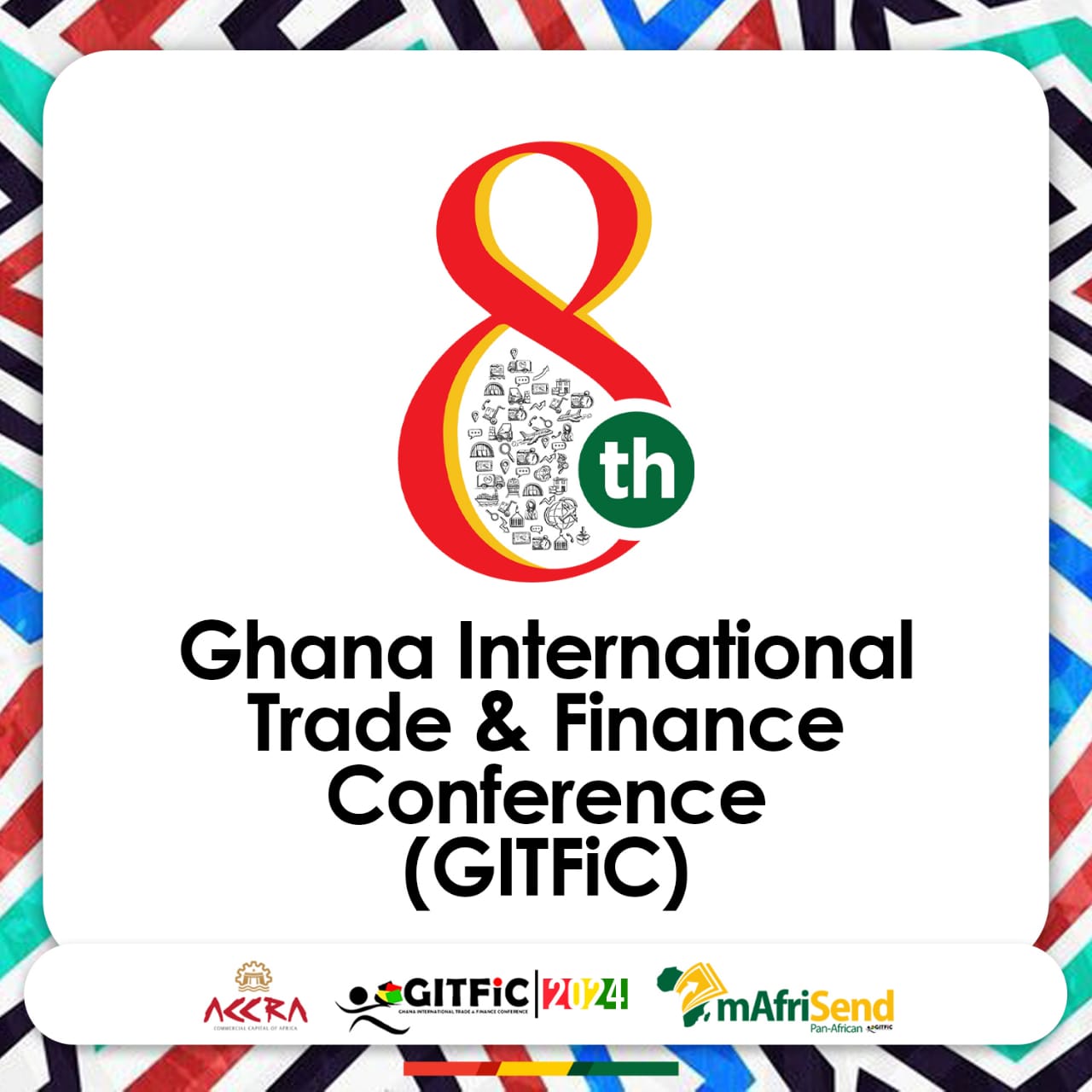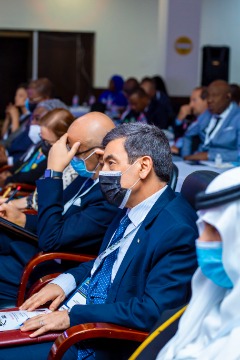8TH GHANA INTERNATIONAL TRADE & FINANCE CONFERENCE – GITFiC 2024


Theme: A Call for a New Global Financing Pact: Collaborative Pathways to Economic Resilience and Global Prosperity
INTRODUCTION:
In an interconnected world where the ripple effects of economic decisions in one country can be felt thousands of miles away, the need for a cohesive and collaborative approach to global financing has never been more evident. The complexities of the modern Global Economy, exacerbated by challenges such as Climate Change, Pandemics, and Geopolitical Tensions, necessitate a paradigm shift in how nations perceive and engage with financial systems. The 8th Ghana International Trade and Finance Conference explores the imperatives for a new Global Financing Pact and delineates collaborative pathways that can pave the way for economic resilience and global prosperity. The call for a new Global Financing Pact (GFP) emerges as a response to these challenges, aiming to foster collaboration among nations and institutions to ensure economic resilience and promote global prosperity.
Historically, the global financial architecture has been characterized by fragmented initiatives, dominated by a few powerful nations or institutions. While such systems have facilitated growth in many regions, they have also perpetuated inequalities, exacerbated vulnerabilities, and limited the capacity of smaller economies to navigate turbulent economic waters independently. The 2008 financial crisis and subsequent economic downturns have highlighted the systemic risks associated with uncoordinated financial policies, underscoring the urgency for a more integrated and collaborative approach.


Furthermore, emerging challenges, such as climate change and the COVID-19 pandemic, have underscored the interdependence of nations and the imperative for collective action. These crises have demonstrated that no country is an island, and unilateral approaches to economic policy are insufficient in addressing multifaceted challenges that transcend borders. In this volatile environment, the need for a collaborative approach to global financing has never been more apparent. Drawing from literary examples and real-world scenarios, the 8th Ghana International Trade and Finance Conference (GITFiC 2024) delves into the theme of establishing a Global Financing Pact (GFP) as a mechanism for ensuring economic resilience and fostering global prosperity.
Climate finance has emerged as a critical component in the global response to climate change, aiming to mobilize financial resources to support mitigation, adaptation, and resilience-building efforts. The 8th Ghana International Trade and Finance Conference (GITFiC 2024) also delves into the intricacies of climate finance, exploring its key dimensions, challenges, and opportunities in fostering a sustainable future. Climate finance remains a cornerstone in the global climate agenda, necessitating concerted efforts to mobilize resources, address funding gaps, and accelerate the transition towards a sustainable, resilient, and low-carbon future. By fostering innovation, enhancing collaboration, and prioritizing equity, policymakers, financial institutions, and stakeholders can unlock transformative pathways that align financial flows with climate objectives, safeguarding the planet and promoting shared prosperity for future generations.
Rationale for a Global Financing Pact – 8th Ghana International Trade and Finance Conference (GITFiC 2024) – Global Debt Initiative
Economic resilience and global prosperity cannot be achieved in isolation. The interconnectedness of today’s world necessitates collaborative efforts, where nations pool resources, share expertise, and align their objectives. The rationale for a call to Global Debt Initiative stems from the increasingly interconnected nature of the world’s economies, necessitating coordinated efforts to address systemic risks and challenges. As economies become more integrated through trade, finance, and technology, the spillover effects of economic policies and shocks have magnified, underscoring the need for a collaborative approach to ensure stability and prosperity. A global financing pact would provide a framework for countries to collectively address common challenges such as financial volatility, climate change impacts, and socioeconomic disparities, leveraging shared resources, expertise, and policy coordination to foster sustainable development and resilience.
The existing global economic architecture, characterized by fragmented financial systems and unequal development, has exhibited vulnerabilities. The COVID-19 pandemic unveiled the inadequacies of unilateral responses, underscoring the need for a cohesive, global strategy. A Global Debt Initiative would institutionalize cooperation, facilitating resource mobilization, risk-sharing, and equitable growth. By harmonizing fiscal policies, leveraging innovative financing mechanisms, and prioritizing sustainable development goals, nations can navigate systemic shocks and catalyze inclusive prosperity.
The 8th Ghana International Trade and Finance Conference is to bring together several agendas (climate finance, development, debt cancellation, Green Economy etc) and to propose innovative solutions to address issues of debt sustainability. It is part of a series of other national and international events that will take place during the year 2024 and aims to push for concrete results on these occasions. Economic policies have been predominantly nation-centric, driven by short-term political considerations rather than long-term global welfare. However, the 21st century’s complex challenges such as pandemics, climate change, and technological disruptions demand a coordinated response. A fragmented approach risks exacerbating inequalities, fostering economic volatility, and hindering sustainable development.
Furthermore, the current global landscape, characterized by rising geopolitical tensions, increasing inequality, and unprecedented challenges, underscores the urgency for a coordinated response A global financing pact would not only facilitate the mobilization of resources to address immediate crises but also promote long-term structural reforms and investments in areas such as infrastructure, education, and innovation. By aligning national interests with global priorities and principles, a global financing pact can help create an enabling environment for sustainable growth, reduce vulnerabilities, and build a more inclusive and resilient global economy.
A Comprehensive Approach to Global Economic Resilience: The Pillars of a New Financial Pact
In the ever-evolving landscape of global economics, there emerges an imperative need for a restructured framework that addresses the multifaceted challenges faced by nations across the spectrum. Central to this discourse are several pivotal elements that collectively form the foundation of a revamped global financial pact. A holistic approach to global economic resilience necessitates a multifaceted strategy anchored in inclusive governance, sustainable financing, risk-sharing mechanisms, capacity building, and unwavering transparency. By embracing these pillars, the envisioned global financial pact aspires to forge a path towards shared prosperity, resilience, and equitable development in an increasingly interconnected world.
Inclusive Governance Structure:
At the heart of this call for a Global Debt Initiative lies an inclusive governance structure, transcending traditional paradigms by ensuring equitable representation for all member nations, regardless of their economic prowess. Such a structure not only fosters trust but also guarantees that the diverse interests of stakeholders, from burgeoning economies to marginalized communities, find resonance in decision-making processes. By championing economic strategies tailored to uplift these often-neglected groups, the pact strives to bridge global income disparities and cultivate an environment conducive to sustainable growth.
Sustainable Financing Mechanisms:
Parallel to governance reform is the imperative to reshape financing paradigms in favor of sustainability and resilience. This entails pioneering innovative instruments like green bonds, impact investment funds, and debt-for-climate swaps. By channeling resources into eco-centric endeavors such as renewable infrastructure and climate-resilient projects, the pact not only addresses pressing environmental concerns but also catalyzes innovation and employment opportunities on a global scale.

Risk-sharing Mechanisms:
In an interconnected global economy, the specter of economic upheavals and natural calamities necessitates collaborative risk mitigation strategies. The proposed pact envisages establishing robust frameworks for risk-sharing among nations. Initiatives could range from regional insurance pools and contingency funds to mutual assistance mechanisms, thereby fostering collective resilience and solidarity during times of crises.
Capacity Building and Technical Assistance:
Recognizing the asymmetries in financial expertise and institutional capacities, particularly among developing economies, the pact underscores the significance of capacity building and technical assistance. By prioritizing initiatives aimed at enhancing financial literacy and bolstering institutional frameworks, nations are empowered to navigate the intricate terrains of global finance, harnessing opportunities for sustainable growth and development.
Transparency and Accountability:
Central to the efficacy of any global financial initiative is a commitment to transparency, accountability, and adherence to universally accepted principles. The pact, therefore, advocates for the implementation of rigorous monitoring and evaluation mechanisms, bolstering international regulations, and fostering collaboration to mitigate systemic risks. Such endeavors not only instill confidence among member nations but also underscore the pact’s commitment to responsible financial stewardship.

Expected Outcomes of the 8th GITFiC on a Call for a Global Debt Initiative
The 8th Ghana International Trade and Finance Conference centers on a call for a Global Debt Initiative represents a pivotal moment in the discourse surrounding international finance and economic stability. Such a gathering holds the potential to catalyze transformative changes, foster collaborative solutions, and chart a course towards sustainable global economic resilience. The Conference holds the promise of forging a path towards enhanced collaboration, debt sustainability, and equitable economic growth. By fostering dialogue, promoting transparency, and prioritizing inclusive participation, participants aim to chart a course that addresses the pressing challenges of debt burdens while fostering conditions conducive to shared prosperity and resilience in an interconnected global landscape. Here are the anticipated outcomes that could emerge from this critical assembly:
Enhanced Multilateral Cooperation:
One of the foremost expectations from the conference is the bolstering of multilateral cooperation among nations, international organizations, and financial institutions. By fostering an environment conducive to dialogue and collaboration, the conference aims to cultivate a unified approach to address burgeoning debt crises, promote debt sustainability, and facilitate coordinated action among stakeholders.
Framework for Debt Restructuring and Relief:
A key outcome envisaged from the conference is the formulation of a comprehensive framework for debt restructuring and relief tailored to meet the unique challenges faced by indebted nations. By leveraging collective expertise and insights, participants aim to devise innovative mechanisms that balance the imperatives of debt sustainability with the socio-economic needs of borrowing nations, thereby fostering conditions for equitable growth and development.
Promoting Transparency and Accountability:
Transparency and accountability are foundational pillars underpinning the efficacy of any global debt initiative. Consequently, the conference is expected to emphasize the implementation of robust transparency measures, debt management practices, and governance frameworks. By enhancing transparency, participants aim to mitigate risks, build trust among stakeholders, and ensure that resources are judiciously allocated to priority areas, such as healthcare, education, and infrastructure.
Inclusive Participation and Stakeholder Engagement:
The conference underscores the importance of inclusive participation, ensuring that the voices of all stakeholders, including indebted nations, civil society organizations, and the private sector, are heard and incorporated into the deliberations. By fostering a platform for open dialogue and engagement, participants aim to harness collective insights, perspectives, and expertise, thereby enriching the discourse and fostering ownership of the global debt initiative.
Capacity Building and Technical Assistance:
Recognizing the complexities associated with debt management and sustainability, the conference is expected to prioritize capacity building and technical assistance initiatives. By fostering partnerships, facilitating knowledge exchange, and leveraging best practices, participants aim to enhance the institutional capacities of indebted nations, empower policymakers, and equip stakeholders with the tools and resources needed to navigate the intricacies of debt dynamics effectively.
Conclusion:
A Call for a Global Debt Initiative through a New Global Financing Pact offers a transformative vision for reshaping the contours of the global economy, fostering collaboration, and advancing shared prosperity. By embracing principles of equity, sustainability, inclusivity, and resilience, and adopting collaborative pathways that leverage multilateral cooperation, public-private partnerships, technological innovation, and capacity building, nations can forge a more resilient, equitable, and prosperous future for all. The time for action is now; the stakes have never been higher, and the opportunities for positive change are within our grasp. The call for a new Global Financing Pact represents a visionary approach to reimagining the international financial architecture. By fostering collaboration, promoting sustainability, and prioritizing inclusivity, the GFP holds the potential to reshape the global economy’s trajectory, ensuring economic resilience and fostering global prosperity for generations to come. The theme of a Global Debt Initiative encapsulates a vision for collaborative pathways to economic resilience and global prosperity. Drawing inspiration from literary works that explore economic systems, alongside real-world imperatives such as climate change, pandemics, and technological advancements, underscores the urgency and relevance of this endeavor. By fostering international cooperation, equitable development, and ethical considerations, a GFP could pave the way for a more resilient, prosperous, and inclusive global economy.
The Global Debt Initiative is not merely an aspirational goal but a necessity in today’s interconnected world. The challenges ahead are formidable, but with collective action and unwavering commitment, a brighter and more prosperous future for all is within reach. It represents a pivotal moment in human history, necessitating visionary leadership, collective action, and unwavering commitment to shared prosperity. By embracing collaborative pathways to economic resilience, nations can transcend geopolitical divides, catalyze sustainable development, and forge a future defined by shared prosperity, innovation, and resilience. As we stand at the crossroads of uncertainty and opportunity, the imperative for a Global Debt Initiative is not merely a call to action but a clarion call for a more inclusive, equitable, and prosperous world for future generations.
Important Resource Pages to visit:
https://gitfic.com/past-conferences/
https://gitfic.com/regional-seminars-on-afcfta/ (Our Regional Seminars on the AfCFTA)
https://gitfic.com/media-press-conferences/
https://gitfic.com/trade-missions-programs/
https://gitfic.com/monthly-research-reports/ (Our Monthly Research Reports)
https://gitfic.com/press-releases/ (A few selected media reportage since 2017)


